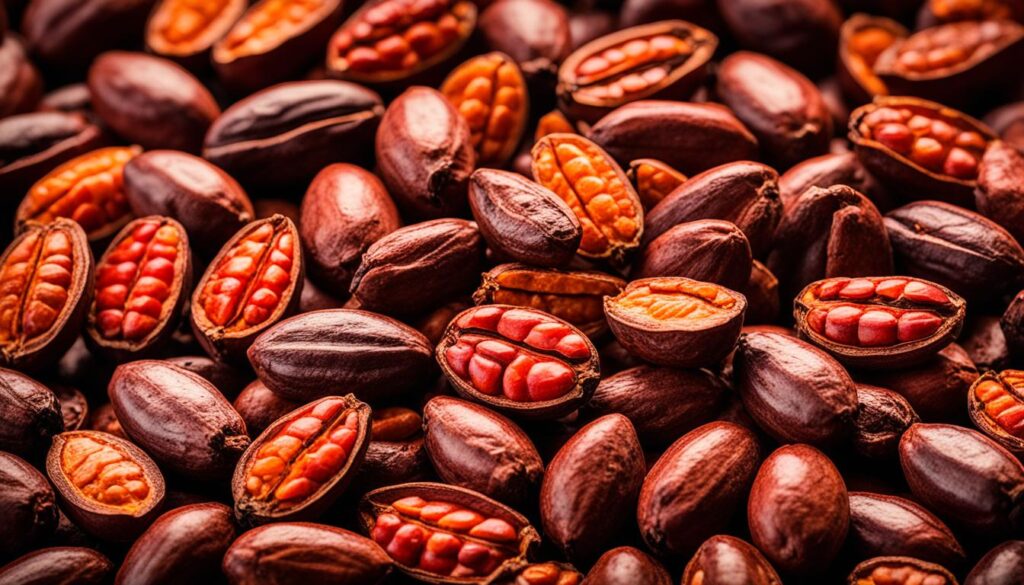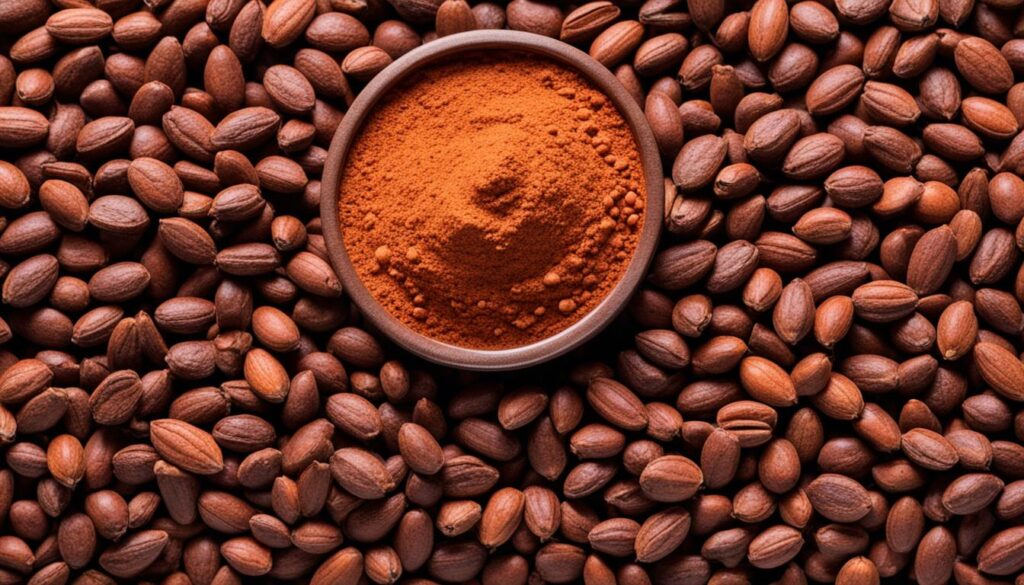Cocoa, the key ingredient in chocolate, is a superfood with a rich history and impressive health benefits. This article explores the main ways cocoa can improve your well-being, from its antioxidant properties to its potential benefits for heart health, brain function, and more. By understanding the remarkable advantages of this versatile ingredient, you can make more informed choices about incorporating cocoa into your diet.
Key Takeaways
- Cocoa is a superfood rich in antioxidants and beneficial compounds
- Cocoa may support cardiovascular health by improving blood flow and reducing blood pressure
- The flavanols in cocoa can enhance brain function and cognitive performance
- Cocoa may possess anti-inflammatory properties and help manage certain health conditions
- Incorporating cocoa into a balanced diet may offer weight management benefits
Introduction to the Wonders of Cocoa
Cocoa, a superfood with ancient roots, has been revered for its health-promoting qualities for centuries. This versatile ingredient, derived from the seeds of the cacao tree, is a rich source of beneficial compounds that have captured the attention of health-conscious individuals worldwide.
Cocoa: A Superfood with Ancient Roots
Tracing its origins back to the Mayan and Aztec civilizations, cocoa has long been recognized for its remarkable properties. These ancient cultures incorporated cocoa into their diets and rituals, harnessing its potential to nourish the body and uplift the spirit. Today, as we delve deeper into the introduction to cocoa and its remarkable cocoa superfood status, we uncover a treasure trove of health benefits that make it a true wonder of nature.
Understanding the Difference Between Cocoa and Chocolate
While cocoa and chocolate are often associated, it’s crucial to understand the difference between cocoa and chocolate. Cocoa is the raw, unprocessed form of the cacao bean, containing a myriad of beneficial compounds. Chocolate, on the other hand, is the product of a more complex manufacturing process, often involving the addition of sugar, milk, and other ingredients that can significantly impact the nutritional profile and health benefits.
Rich in Antioxidants and Flavonoids

Cocoa is an exceptional source of antioxidants, particularly polyphenols such as flavanols. These antioxidants and flavonoids in cocoa help neutralize harmful free radicals, reducing oxidative stress and inflammation in the body. Regularly consuming cocoa can provide a powerful boost to your antioxidant defenses, potentially contributing to a lower risk of chronic diseases and improved overall health.
Cocoa’s Polyphenol Power
The polyphenols found in cocoa are a key component of its impressive health benefits. These plant-based compounds act as potent antioxidants, scavenging and neutralizing harmful free radicals that can cause cellular damage and inflammation. By promoting a healthy balance of antioxidants and oxidants, cocoa’s polyphenols may help protect the body from the detrimental effects of oxidative stress.
Fighting Free Radicals and Oxidative Stress
Cocoa’s rich antioxidant profile, including its flavonoids and polyphenols, makes it a powerful tool in the fight against free radicals and oxidative stress. These harmful molecules can contribute to the development of various chronic conditions, such as heart disease, cancer, and neurodegenerative disorders. By incorporating cocoa into your diet, you can boost your body’s natural defenses and potentially reduce your risk of these health concerns.
Cardiovascular Health and Cocoa

Numerous studies have suggested that cocoa may have a positive impact on cardiovascular health. The flavanols in cocoa can help improve blood flow and endothelial function, leading to lower blood pressure. This is particularly relevant as high blood pressure is a major risk factor for heart disease.
Improving Blood Flow and Reducing Blood Pressure
The flavanols in cocoa have been shown to enhance the production of nitric oxide, a compound that helps dilate blood vessels and improve blood flow. This improved blood flow can lead to a reduction in blood pressure, potentially reducing the strain on the cardiovascular system.
Potential Benefits for Heart Disease Prevention
In addition to its effects on blood flow and pressure, the antioxidant properties of cocoa may also contribute to a reduced risk of heart disease. Cocoa has been found to improve cholesterol levels and reduce inflammation, both of which are important factors in the development of cardiovascular disease.
What are the main health benefits of cocoa?

Cocoa’s beneficial effects extend far beyond its delightful taste – it offers a wealth of advantages for brain health and cognitive performance. The flavanols found in cocoa have been shown to enhance blood flow to the brain, potentially improving memory, attention, and overall cognitive function.
Boosting Brain Function and Cognitive Performance
Regularly consuming cocoa may help boost brain power and enhance cognitive abilities. The flavanols in cocoa have been linked to improved memory, better focus and concentration, and enhanced overall cognitive performance. By promoting increased blood flow to the brain, cocoa can support the brain’s ability to function at its best.
Cocoa’s Role in Neuroprotection and Mood Enhancement
Interestingly, cocoa’s benefits extend beyond just cognitive enhancement – it may also play a role in neuroprotection and mood improvement. The antioxidant and anti-inflammatory properties of cocoa’s flavanols have been shown to help protect the brain from age-related decline and neurodegenerative conditions. Additionally, cocoa consumption has been associated with improved mood and emotional well-being, potentially due to its influence on neurotransmitter activity and regulation of stress hormones.
| Benefit | Description |
|---|---|
| Improved Brain Function | The flavanols in cocoa enhance blood flow to the brain, boosting memory, attention, and overall cognitive performance. |
| Neuroprotection | Cocoa’s antioxidant and anti-inflammatory properties help protect the brain from age-related decline and neurodegenerative conditions. |
| Mood Enhancement | Consuming cocoa has been associated with improved mood and emotional well-being, potentially due to its influence on neurotransmitters and stress hormones. |
Cocoa and Blood Sugar Regulation

Emerging research suggests that the abundance of beneficial compounds found in cocoa may play a role in regulating blood sugar levels. The flavanols and polyphenols inherent in cocoa have demonstrated potential anti-diabetic effects by improving insulin sensitivity and helping to maintain healthy blood sugar control.
Several studies have indicated that incorporating cocoa or dark chocolate into a balanced diet may offer advantages for individuals concerned about managing their blood sugar levels or reducing the risk of type 2 diabetes. The antioxidant properties of cocoa’s flavanols may contribute to these positive metabolic effects, making it a promising addition to a diabetes-friendly eating plan.
As the research continues to evolve, exploring the relationship between cocoa, blood sugar, and diabetes remains an active area of investigation. By understanding the promising link between cocoa and blood sugar regulation, health-conscious individuals can make more informed choices about incorporating this versatile superfood into their lifestyle.
Potential Anti-Inflammatory Properties

Cocoa’s rich antioxidant profile may also contribute to its anti-inflammatory properties. The polyphenols in cocoa have been shown to help reduce markers of inflammation in the body, which is particularly relevant for individuals dealing with chronic inflammatory conditions. Incorporating cocoa into one’s diet may offer potential benefits for managing inflammatory-related health concerns.
Cocoa’s Impact on Chronic Inflammation
A study by Cady et al. in 2013 indicated that the inclusion of cocoa as a dietary supplement could repress the expression of inflammatory proteins in the spinal trigeminal nucleus in response to chronic trigeminal nerve stimulation. Research by Spencer et al. in 2012 suggests that flavonoids found in cocoa may modulate neuroinflammation and its mechanisms of action. Additionally, in vitro studies, such as those by Ramiro-Puig et al. in 2005 and Zeng et al. in 2011, point to the down-regulation of inflammatory mediators through the consumption of flavonoids present in cocoa.
Implications for Inflammatory Conditions
The research by Al-Hanbali et al. in 2009 demonstrated that epicatechin, a compound found in cocoa, could suppress the production of interleukin-6 and interleukin-8 while enhancing interleukin-10 production with NF-κB nuclear translocation in a whole blood stimulated system. The anti-inflammatory properties of clovamide and phenolic extracts from cocoa in human monocytes were explored by Zeng et al. in 2011. Additionally, studies by Borghi et al. in 2016 and Calixto-Campos et al. in 2015 mentioned the role of quercetin, a flavonoid found in cocoa, in inhibiting nociceptive mechanisms related to pain.
| Study | Findings |
|---|---|
| Cady et al. (2013) | Cocoa supplement repressed inflammatory protein expression in the spinal trigeminal nucleus in response to chronic nerve stimulation. |
| Spencer et al. (2012) | Cocoa flavonoids may modulate neuroinflammation and its mechanisms of action. |
| Ramiro-Puig et al. (2005) and Zeng et al. (2011) | Consumption of cocoa flavonoids may down-regulate inflammatory mediators. |
| Al-Hanbali et al. (2009) | Epicatechin from cocoa could suppress interleukin-6 and interleukin-8 production while enhancing interleukin-10 with NF-κB modulation. |
| Zeng et al. (2011) | Clovamide and phenolic extracts from cocoa exhibited anti-inflammatory properties in human monocytes. |
| Borghi et al. (2016) and Calixto-Campos et al. (2015) | Quercetin, a flavonoid in cocoa, can inhibit nociceptive mechanisms related to pain. |
Weight Management and Cocoa

Interestingly, cocoa may also play a role in weight management. Some studies suggest that the compounds in cocoa may help regulate appetite, potentially contributing to a feeling of fullness and reduced calorie intake. This could be particularly beneficial for individuals looking to maintain a healthy weight or manage obesity.
Cocoa’s Potential Role in Appetite Regulation
The flavanols and other bioactive compounds found in cocoa have been shown to have a positive impact on appetite control. By influencing hormones and neurotransmitters involved in hunger and satiety, cocoa may help promote a sensation of fullness, potentially leading to reduced calorie consumption and supporting weight management efforts.
Exploring the Relationship Between Cocoa and Obesity
Ongoing research is examining the potential relationship between cocoa consumption and the risk of obesity. While the evidence is still emerging, some studies suggest that regular intake of cocoa-rich products may contribute to a lower body mass index (BMI) and a reduced likelihood of developing obesity. However, more research is needed to establish a clear and direct connection between cocoa and weight management.
Skin Health and Cocoa

Cocoa’s impressive health benefits extend beyond internal systems, as it may also offer remarkable advantages for the skin. The antioxidants and flavonoids found in cocoa have been shown to have protective effects on the skin, potentially helping to prevent sun damage, reduce the visible signs of aging, and promote overall skin health.
Cocoa’s Protective Effects on Skin
The polyphenols and flavanols present in cocoa and skin health are powerful antioxidants that can help shield the skin from the damaging effects of UV radiation and environmental stressors. By neutralizing free radicals and reducing oxidative stress, these remarkable compounds may support the skin’s natural defenses, enhancing its ability to maintain a youthful, radiant appearance.
Potential Benefits for Skin Aging and Damage
Ongoing research suggests that regular consumption of cocoa may also contribute to improved cocoa and skin aging by mitigating the visible signs of aging. The flavanols in cocoa have been observed to promote collagen production, improve skin elasticity, and reduce the appearance of fine lines and wrinkles. Furthermore, the cocoa and skin protection properties of cocoa may help protect the skin from sun-induced damage, supporting a more even, healthy-looking complexion.
Conclusion
In conclusion, cocoa is a remarkable superfood with a wide range of potential health benefits. From its antioxidant and anti-inflammatory properties to its positive impacts on cardiovascular health, brain function, and beyond, incorporating cocoa into a balanced diet may offer numerous advantages for overall well-being. As highlighted by studies like those conducted by Almoosawi et al. in 2010 and Baba et al. in 2007, the polyphenolic compounds in cocoa have been shown to positively influence factors such as cholesterol levels, blood pressure, and glucose regulation.
While the research on the health benefits of cocoa is promising, it’s important to consult with a healthcare professional to determine the best approach for your individual needs. By understanding the remarkable health benefits of cocoa, you can make more informed choices to support your long-term health and wellness. As the studies by Buijsse et al. in 2006 and 2010 have demonstrated, the regular consumption of cocoa-based products may contribute to a reduced risk of cardiovascular disease and improved overall health outcomes.
Overall, the versatility and potent nutritional profile of cocoa make it a valuable addition to a balanced and health-conscious diet. By incorporating this superfood into your routine, you can take proactive steps towards optimizing your well-being and enjoying the conclusion on health benefits of cocoa.

Leave a Reply